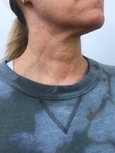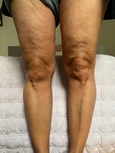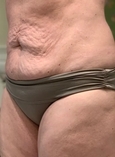What age does crepey skin start?
Crepey skin typically begins when people are in their 40s, but that’s a huge generalization. Some may experience it earlier if they’ve lost a bit of weight, or had a lot of sun damage, while others might not have crepey skin until their 70s. Skin aging happens at drastically different rates depending on your skin tone, environment, diet/alcohol habits, and genes.1 For example, Caucasian skin is thinner and more susceptible to UV damage than skin of color, so it begins to show signs of aging sooner.2 Generally, skin begins to show more pronounced signs of aging (wrinkles, lack of elasticity, sagginess, crepiness) by age 50, while studies have found skin shows signs of dryness (that can make crepiness worse) in the 40s-50s.3
But if you’re asking this question because you want to take some preventative measures in your 20s and 30s to keep the skin as healthy as possible, well, remember to moisturize, keep sun exposure minimal, and get intimately acquainted with retinoids—there’s a long road ahead.
References:
1Comparison of age-related changes in wrinkling and sagging of the skin in Caucasian females and in Japanese females by Kazue Tsukahara et al. J Cosmet Sci.
2Aging Differences in Ethnic Skin by Neelam A. Vashi, MD et al. J Clin Aesthet Dermatol.
3Skin Quality – A Holistic 360° View: Consensus Results by Katie Goldie et al. Clin Cosmet Investig Dermatol.
Get Updates
There’s more to come.
Sign up to receive periodical updates on Mass Index, and to be the first to know when Soft Services launches new products. (If we don’t have any updates, we won’t email you.)
Crepey Skin
Skin that’s lost elasticity and appears finely wrinkled like tissue paper.
Also Called
Tissue skin, thin skin, thinning skin, fragile skin
Frequently Found On
Neck, chest, arms, stomach, and eyelids
Related Concerns
Learn More: Crepey Skin


















